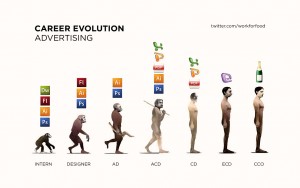 The major challenge affecting agencies today is how to keep up with technology as it explodes in the communications landscape around us – never before in the history of the business have so many changes, happened so fast and with such greater impact. As we try to keep up, to learn, to understand and to apply we must look from the outside like a flailing, drowning animal in a see of concepts that we do not understand and as a result we clutch at any number of different solutions, sending people to conferences, internal training sessions, online training and to a certain extent a reliance on experts to input to our work to make it better… and more digital. But is all this really working? Are agency staffers becoming more digital, is the work from what we still refer to as ‘traditional agencies’ evolving to our web 2.0 society?
The major challenge affecting agencies today is how to keep up with technology as it explodes in the communications landscape around us – never before in the history of the business have so many changes, happened so fast and with such greater impact. As we try to keep up, to learn, to understand and to apply we must look from the outside like a flailing, drowning animal in a see of concepts that we do not understand and as a result we clutch at any number of different solutions, sending people to conferences, internal training sessions, online training and to a certain extent a reliance on experts to input to our work to make it better… and more digital. But is all this really working? Are agency staffers becoming more digital, is the work from what we still refer to as ‘traditional agencies’ evolving to our web 2.0 society?
I ask myself these questions on a daily basis, challenged both by questions internally and from clients – there isn’t enough digital strategy bandwidth to go around – and I’m searching for that magic solution that will bring everyone to a par level in knowledge terms and uplift the whole agency product. But the internet, digital and the paradigm shift that it has created is not like growing grain; the quote from Lao Tzu:
Give a man a fish; feed him for a day. Teach a man to fish; feed him for a lifetime.
Which defines a simple, scientific, step by step solution to break the vicious circle of hunger, but the paradigm shift here is so complex that there is no easy plan that can be applied – and so I look back at how humans, and humanity learnt to walk.
At a species level we came out of the water, slithering across the land and after generations of challenge and natural selection developed legs to transport ourselves across the earth (we later found horses and developed bicycles and cars, but that is another story) – there was no way to learn, nothing to aim for but a simple process of survival of the fittest that finally gave us the ability to walk and so defined the human race; At an individual level we do not teach children to walk from a book, or even by explaining it to them – they realise both that they have their own legs and also see those around them up on two feet and walking, so slowly over time after much pain and failure they find the right combination of muscle strength, balance and coordination to put one foot in front of the other.
Comparing the digital age with walking is, I agree, rather dramatic and extreme – but the parallels are nonetheless clear; a major change in the way we do things and a concept that is very difficult to teach in a traditional academic way. To achieve success we must spend hours watching, understanding and trying over and over again – not all of us will succeed, only those with the bravery to push themselves beyond their current framework and the strength to keep doing this over and over again.
What does this mean in practice?
In practice it potentially means that the transformation of people and agencies cannot happen overnight, and probably not in the timeframes that we have in mind, and that the formal training we put in place is likely to be of real little value in the grand scheme of things (much as speakers are of great interest and books can get to the heart of the problem, the listener and reader are potentially not primed for this information) – but also that the population as a whole is evolving, that we as ‘users’ are becoming more digital in our lives and so the endgame is almost laid out for those that can stay the course – the younger, the more daring, those that might have started earlier.
It means that we need to experience and to challenge our people – to force them to evolve by putting in place a path that gives them no option – by removing all support that might have been a way around the delivery of digital and by making sure they fail as many times as they succeed.